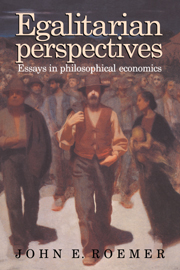Book contents
- Frontmatter
- Contents
- Acknowledgments
- List of sources
- Introduction
- Part I Exploitation
- Introduction to Part I
- 1 Exploitation, alternatives and socialism
- 2 Property relations vs. surplus value in Marxian exploitation
- 3 Should Marxists be interested in exploitation?
- 4 What is exploitation? Reply to Jeffrey Reiman
- 5 Second thoughts on property relations and exploitation
- Part II Equality of resources
- Part III Bargaining theory and justice
- Part IV Public ownership and socialism
- References
- Index
4 - What is exploitation? Reply to Jeffrey Reiman
Published online by Cambridge University Press: 23 December 2009
- Frontmatter
- Contents
- Acknowledgments
- List of sources
- Introduction
- Part I Exploitation
- Introduction to Part I
- 1 Exploitation, alternatives and socialism
- 2 Property relations vs. surplus value in Marxian exploitation
- 3 Should Marxists be interested in exploitation?
- 4 What is exploitation? Reply to Jeffrey Reiman
- 5 Second thoughts on property relations and exploitation
- Part II Equality of resources
- Part III Bargaining theory and justice
- Part IV Public ownership and socialism
- References
- Index
Summary
In a recent article, Jeffrey Reiman criticizes me for defanging Marx's concept of exploitation by replacing its classic definition with a “distributive” one. Reiman writes that “a society is exploitative when its social structure is organized so that unpaid labor is systematically forced out of one class and put at the disposal of another” (3). I have written that a group of people S is exploited by its complement S′ in a society with private ownership of the means of production if S would benefit, and S′ would suffer, by a redistribution of ownership in the means of production in which each owned his per capita share. Call this the property relations (PR) definition of exploitation. A third definition of exploitation, the unequal exchange (UE) definition, states that an agent who expends in production more hours of labor than are embodied in the goods he can purchase with his revenues from production (which may come from wages, profits, or the sale of commodities) is exploited, while one who can purchase goods embodying more social labor than he expended in production is an exploiter.
In my book A General Theory of Exploitation and Class, I took the UE definition to be a generalization of Marx's. I showed that by using this definition, one could rigorously construct a theory of exploitation and class formation that captured many classic Marxist insights, and had the virtue of deriving as theorems what had been, classically, assumed as postulates.
- Type
- Chapter
- Information
- Egalitarian PerspectivesEssays in Philosophical Economics, pp. 97 - 103Publisher: Cambridge University PressPrint publication year: 1994
- 1
- Cited by



